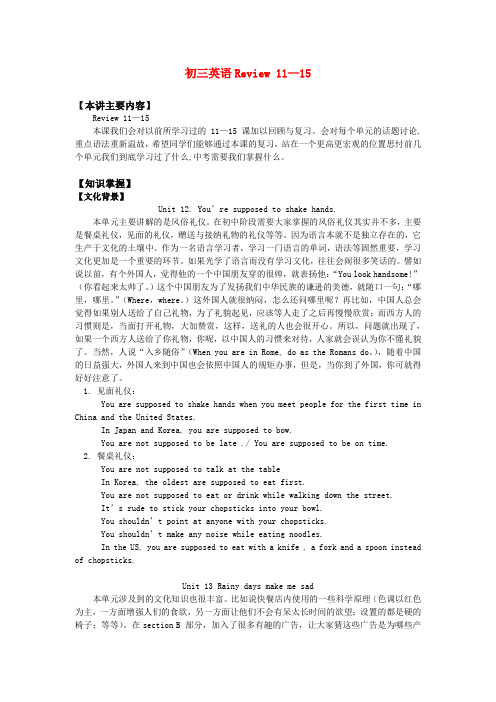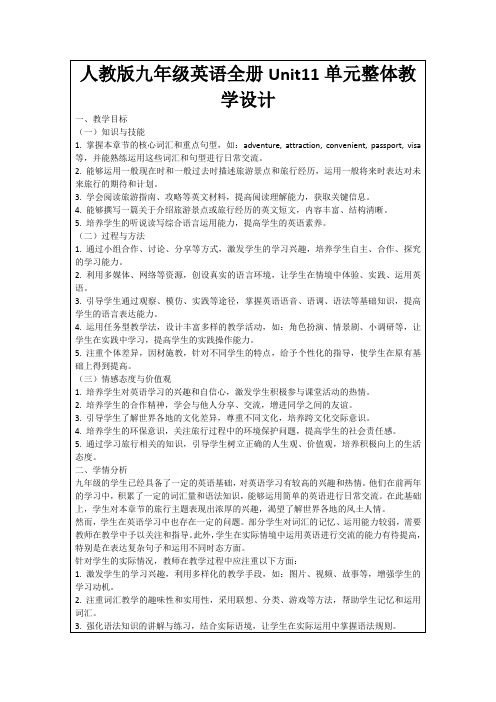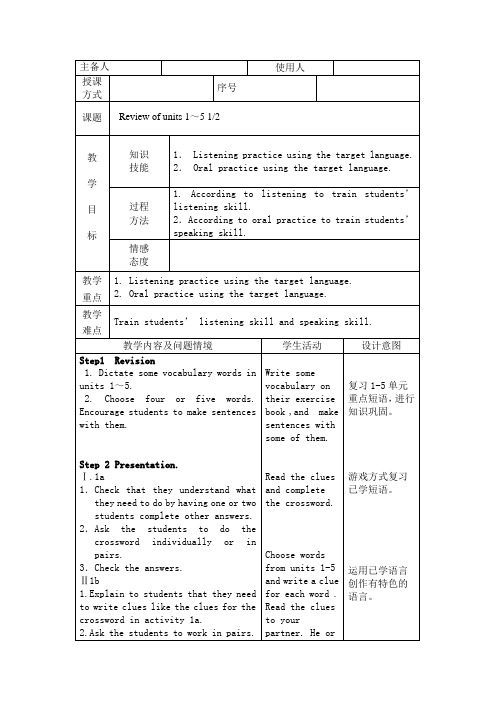Review of units 11—15 教案设计
《Review of Units 1—2 》 教学设计

《Review of Units 1—2 》教学设计一、教学目标1、知识目标学生能够熟练掌握 Units 1—2 中的重点词汇、短语和句型。
学生能够理解并运用所学的语法知识,如一般现在时、现在进行时等。
2、技能目标提高学生的听、说、读、写综合语言运用能力。
培养学生的阅读理解和书面表达能力。
3、情感目标激发学生学习英语的兴趣和积极性。
增强学生的合作意识和团队精神。
二、教学重难点1、教学重点重点词汇:_____、_____、_____等。
重点短语:_____、_____、_____等。
重点句型:_____、_____、_____等。
语法:一般现在时和现在进行时的构成及用法。
2、教学难点现在进行时与一般现在时的区别和运用。
如何让学生在实际情境中灵活运用所学的词汇、短语和句型进行交流。
三、教学方法1、情景教学法通过创设生动的情景,让学生在实际情境中学习和运用英语,提高学生的语言运用能力。
2、任务驱动法布置各种任务,让学生在完成任务的过程中巩固所学知识,培养学生的自主学习能力和合作精神。
3、游戏教学法采用游戏的形式,激发学生的学习兴趣,活跃课堂气氛,提高学习效果。
四、教学过程1、导入(5 分钟)播放一段与 Units 1—2 主题相关的英语视频或歌曲,引起学生的兴趣。
提问学生关于视频或歌曲的内容,引导学生回忆所学知识。
2、词汇复习(10 分钟)展示 Units 1—2 的重点词汇,让学生朗读并拼写。
通过图片、例句等方式帮助学生理解词汇的含义和用法。
3、短语复习(10 分钟)呈现 Units 1—2 的重点短语,让学生说出其汉语意思。
创设情境,让学生用所学短语进行造句。
4、句型复习(15 分钟)讲解 Units 1—2 的重点句型,分析其结构和用法。
让学生进行句型转换练习,如陈述句变疑问句、肯定句变否定句等。
5、语法复习(20 分钟)对比讲解一般现在时和现在进行时的构成、用法和时间状语。
给出一些句子,让学生判断其使用的时态,并说明原因。
新目标九年级英语教案示例Reviewofunits1115第三

新目标九年级英语教案示例Review ofunits 11-15 第三新目标九年级英语教案示例Review of units 11-15 第三课时教学设计第三课时教学设计教学目标 1.围绕“我最喜爱去的地方和最喜欢做的事情。
”为题开展采访活动,复习Unit11的目标语言; 2.对“你想到什么地方去和喜欢做什么事情”进行调查,复习would like句型; 3.通过辩论,帮助学生复习Units 11~15的目标语言。
教学方式任务型教学法,多媒体辅助教学。
教学设计热身(Warm-up):故事接龙。
用多媒体课件在屏幕上展现四幅图片,第一幅:玛丽起床,一看闹钟八点了;第二幅:不吃早餐,匆忙上学;第三幅:赶不上公共汽车,跑步回校;第四幅:没有一个同学回校上课,原来是星期天。
由第一个学生讲故事的第一句,然后第二个学生接下去,以此类推,直到讲完整个故事。
(通过故事接龙活动,培养学生用英语即兴表达的能力和想像力。
)复习(Revision):复习Units 11~15的目标语言。
听写11~15的重点单词和短语,选五个单词,让学生造句。
练习(Practice):任务六:我最喜爱的本活动是一个自由采访活动,复习Unit 11的目标语言。
(1)教师布置任务,让学生明白任务的要求。
老师说,What kind of...do you like?提问几个学生相同的问题,让学生作出回答。
(2)学生根据书本上的表格内容,填上自己喜爱去的场所,还有其他同学喜欢去的地方。
(3)学生自由采访两名同学,把采访结果填入表格。
他们会用到这些句子,A:What kind of museums do you like? B: I like history museums. They’re interesting.A:Really? I prefer sciencemuseums. (4)在小组汇报采访结果。
(5)用举手或投票的'方式,选出同学们最喜欢去的场所。
初三英语review 11—15知识精讲

初三英语Review 11—15【本讲主要内容】Review 11—15本课我们会对以前所学习过的11—15课加以回顾与复习。
会对每个单元的话题讨论,重点语法重新温故,希望同学们能够通过本课的复习,站在一个更高更宏观的位置思忖前几个单元我们到底学习过了什么,中考需要我们掌握什么。
【知识掌握】【文化背景】Unit 12. You’re supposed to shake hands.本单元主要讲解的是风俗礼仪。
在初中阶段需要大家掌握的风俗礼仪其实并不多,主要是餐桌礼仪,见面的礼仪,赠送与接纳礼物的礼仪等等。
因为语言本就不是独立存在的,它生产于文化的土壤中。
作为一名语言学习者,学习一门语言的单词,语法等固然重要,学习文化更加是一个重要的环节。
如果光学了语言而没有学习文化,往往会闹很多笑话的。
譬如说以前,有个外国人,觉得他的一个中国朋友穿的很帅,就表扬他:“You look handsome!”(你看起来太帅了。
)这个中国朋友为了发扬我们中华民族的谦逊的美德,就随口一句:“哪里,哪里。
”(Where,where。
)这外国人就很纳闷,怎么还问哪里呢?再比如,中国人总会觉得如果别人送给了自己礼物,为了礼貌起见,应该等人走了之后再慢慢欣赏;而西方人的习惯则是,当面打开礼物,大加赞赏,这样,送礼的人也会很开心。
所以,问题就出现了,如果一个西方人送给了你礼物,你呢,以中国人的习惯来对待,人家就会误认为你不懂礼貌了。
当然,人说“入乡随俗”(When you are in Rome, do as the Romans do。
),随着中国的日益强大,外国人来到中国也会依照中国人的规矩办事,但是,当你到了外国,你可就得好好注意了。
1. 见面礼仪:d to shake hands when you meet people for the first time in China and the United States.2. 餐桌礼仪:at the tableof chopsticks.Unit 13 Rainy days make me sad本单元涉及到的文化知识也很丰富。
2013年秋九年级英语全册 Review of Units 11-15精美导学案(无答案) 人教新目标版

Review of Units 11-15精美导学案【课题】Review of Units 11-15 (1课时)【学习目标】 1. 复习Units 11-15的重要词汇。
2. 复习Units 11-15的重要句型结构的运用。
【重点、难点】复习和巩固Units 11-15的重点词汇及句型的运用。
【导学指导】温故知新单词听写竞赛。
从Units 11-15中,选出一些重点词汇进行听写比赛。
自主互助学习一、自主预习1.译译,读读,记记1)材料,物质 2)商业,生意 3)塑料(制)的,塑料4)确定,当然 5)自豪的,骄傲的 6)国旗7)Forbidden City 8)recycled material 9)classical music10)save the environment 11)plastic bags 12)cloth bags2. 预习1a, 独立完成1a的任务。
二、合作探究1. business n.“商业,生意”, 形容词为__________. “忙于做某事”译为2. proud adj. “自豪的,骄傲的”, 名词为___________.其结构 be proud of = 译为三、合作互动1. 小组讨论自主预习2的答案。
2. 小组合作完成1b的任务。
3. 角色扮演。
小组合作完成2c的对话练习。
4. 调查报告。
小组合作采访班上两名同学完成P126,Part 3的表格,再进行展示交流。
5. 小组合作,先完成P126,Par t 4的表格里的问题,再进行对话演练。
6. 小组合作,先完成P126 ,Part 5的表格,然后进行角色扮演。
7. 小组合作,先完成P127, Pa rt 6的表格,再进行对话练习。
8. 先自己列出这个月需要做的五件事情,再和同伴讨论交流,完成P127,Part 79. 先自己写出认为在中国最重要的动物及原因,然后用方框中的词汇小组讨论交流。
四、听力练习1. 2a 先看懂四幅图片的内容,明确听力要求,再认真听录音内容,完成任务。
人教版九年级英语全册Unit11单元整体教学设计

3.强化语法知识的讲解与练习,结合实际语境,让学生在实际运用中掌握语法规则。
4.针对学生个体差异,实施分层教学,关注每个学生的学习需求,提高他们的自信心和学习积极性。
5.创设丰富的语言环境,鼓励学生大胆开口,提高学生的听说能力和口语表达能力。
人教版九年级英语全册Unit11单元整体教学设计
一、教学目标
(一)知识与技能
1.掌握本章节的核心词汇和重点句型,如:adventure, attraction, convenient, passport, visa等,并能熟练运用这些词汇和句型进行日常交流。
2.能够运用一般现在时和一般过去时描述旅游景点和旅行经历,运用一般将来时表达对未来旅行的期待和计划。
四、教学内容与过程
(一)导入新课(500字)
1.教师通过展示一组世界各地旅游景点的图片,引导学生观察并询问:“Where have you been? Where would you like to go?”,让学生分享自己的旅行经历和梦想。
2.学生分享后,教师引入本节课的主题:“Today, we are going to learn about travels and adventures. We will talk about some famous attractions and our travel experiences.”
五、作业布置
为了巩固本节课所学知识,培养学生的自主学习能力和实际运用能力,特布置以下作业:
1.完成课后练习册的相关练习,巩固词汇和语法知识。
-选择题:检测学生对词汇和时态知识的掌握程度。
-填空题:培养学生运用所学词汇和句型进行填空的能力。
新目标八年级英语下Reviewofunits15教案备考经验分享

As an English teacher, I am always looking for ways to improve my teaching and help my students succeed. Recently, I have been preparing for the review of units 1-5 in the New Target 8th grade English textbook. Through careful planning and preparation, I have learned some valuable tips and tricks that I would like to share.Firstly, I found that it was important to review the key vocabulary and grammar structures from each unit in order to refresh students' memory and help them make connections between different topics. This can be done through various activities, such as matching games, flashcards, and sentence-building exercises. By doing so, students become more confident in their ability to use words and structures correctly in different contexts.Another useful technique was to incorporate real-world applications of the language into my lessons, which made the material more engaging and relevant to students' lives. For example, in the unit on travel, I used travel brochures and online resources to teach students about popular tourist destinations around the world, and had them practice using vocabulary and grammar structures to describe different aspects of these places.It was also important to provide opportunities for students to practice speaking and listening, as this is often one of the most challenging aspects of learning a new language. To do this, I incorporated group work and peer-to-peer interactions into my lessons, such as role-playing exercises, debates, and discussions on current events. By doing so, students became more comfortable expressing their opinions and responding to others in English.In addition, I found that it was helpful to provide regular feedback and constructive criticism to students throughout the review process. This not only helps them identify areas for improvement, but also gives them a sense of accomplishment and motivation to continue learning. For example, I would give them specific feedback on their pronunciation, grammar usage, and overall communication skills, and encourage them to work on these areas outside of class.Finally, I made sure to create a positive and supportive classroom environment that encourages students to take risks and make mistakes. Learning a new language can be intimidating, but by creating a safe and encouragingatmosphere, students become more confident in their abilities and are more willing to try new things.In conclusion, preparing for the review of units 1-5 in the New Target 8th grade English textbook requires careful planning and preparation, as well as a dedication to creating a supportive learning environment that encourages students to take risks and learn from their mistakes. By implementing these tips and tricks, I have been able to help my students succeed and master the content covered in these units.。
Review of units 1~5 12 九年级英语教案

Ⅳ.2b
1.Set a time limit of two minutes. Students go through the lists of questions.
2.Ask the students to listen to the same recording again, complete the four different questions next to the pictures in Activity2a.
Role play ,
Practice the conversations in activity 2b with their partner.
复习1-5单元重点短语,进行知识巩固。
游戏方式复习已学短语。
运用已学语言创作有特色的语言。
运用已学知识,进行听力练习。
运用所学知识进行口语练习,提高口语表达能力。
3.Let students check their answers in pairs, and then with the whole class.
Ⅴ.2c
1.Read the instructions to the class.
Point out the sample conversation in the box. Invite a pair of students to read it to the class.
Step 2 Presentation.
Ⅰ.1a
1.Check that they understand what they need to do by having one or two students complete other answers.
新目标八年级英语下Reviewofunits15教案知识点回顾

As the end of the eighth grade approaches, it is important to take a look back at the knowledge that has been gained over the course of the year. Units 1-5 of the New Target English curriculum have provided a strong foundation in the language, covering a wide range of topics from school life to travel. Below is a brief review of the key points covered in each unit.Unit 1 - Getting to Know YouIn this unit, students were introduced to the basics of English grammar, including verb tenses, subject-verb agreement, and pronouns. Vocabulary related to describing oneself and others was also introduced, with words such as shy, outgoing, and confident. The unit also focused on building speaking and listening skills, with activities that allowed students to practice asking and answering questions about themselves and other people.Unit 2 - School LifeUnit 2 focused on vocabulary related to school life, including subjects, activities, and routines. Grammar topics included prepositions, conjunctions, and the use of 'thereis/are' to describe classroom features. Activities such as role-playing and group discussions were used to reinforce language skills and build confidence in speaking.Unit 3 - EntertainmentIn this unit, students learned vocabulary related to entertainment and leisure time, including music, movies, television, and sports. Grammar topics included adjectives, adverbs, and comparative/superlative forms. Listening and reading activities were used to expose students to authentic examples of entertainment media and build comprehension skills.Unit 4 - Travel and TransportationUnit 4 introduced vocabulary related to travel and transportation, including modes of transport, travel vocabulary, and key tourist attractions. Grammar topics included the present continuous tense, reflexive pronouns, and the use of 'must' and 'should' for making suggestions and giving advice. Speaking activities focused on practicing travel-related conversations and making travel plans.Unit 5 - Science and TechnologyThe final unit of the year focused on vocabulary related to science and technology, including words and phrasesrelated to computers, the internet, and social media. Grammar topics included the passive voice, reported speech, and gerunds and infinitives. Writing skills were emphasized, with activities that required students to write about science-related topics and express their opinions on technology.Overall, the units covered in the eighth-grade curriculum provided a well-rounded introduction to English language learning, with a focus on vocabulary building, grammar, and speaking/listening skills. Students should continue to practice using the language in real-life situations and seek opportunities to expand their knowledge outside of the classroom. By doing so, they can build a strong foundationfor future English language learning and communication.。
- 1、下载文档前请自行甄别文档内容的完整性,平台不提供额外的编辑、内容补充、找答案等附加服务。
- 2、"仅部分预览"的文档,不可在线预览部分如存在完整性等问题,可反馈申请退款(可完整预览的文档不适用该条件!)。
- 3、如文档侵犯您的权益,请联系客服反馈,我们会尽快为您处理(人工客服工作时间:9:00-18:30)。
Review of units 11—15单元分析与提示●○内容提示本单元为复习单元,我们通过“自由采访”“调查汇报”“填写表格”“玩游戏”等形式的活动,复习巩固Units 11~15所学的内容,提高学生听、说、读、写能力。
●○目标提示语言目标1、以问路为话题,帮助学生获取、分析、处理和使用信息,从而学习宾语从句。
2、以各国的礼仪和习俗为话题,谈论如何与人相处之道,学习多种表达礼仪的方式。
3、以谈论某事对自己产生刺激为话题,学习表达喜怒哀乐等情感的语言知识。
4、以最近发生的事情为话题,巩固和复习现在完成时的用法。
5、以辩论某事为话题,发表不同的观点,表明不同的态度。
认知目标1、复习Units 11~15的词汇。
2、掌握握宾语从句、现在完成时态、现在进行时、被动语态等。
3、学会以下基本句型:force sb.To do sth.no longer/any longer used to be/get used toWhat are you supposed to do when you meet someone?It makes me kind of angry. Make me happy/make me want to leave.It’s time to feed my dogs.Be made of /fromI agree/disagree with you情感目标1、通过谈论礼仪风俗习惯,从中获取更多的文化知识。
2、通过寻根问祖的交流活动,激发学生的爱国之情,从而养成爱家乡、爱祖国的好品德。
3、通过谈论动物的生存地方,培养学生的人与自然和谐相处的审美观念。
4、以谈论旅游整理包裹的自理能力,培养学生从小“自己的事情自己做”的好习惯。
●○教学提示利用多媒体,如音乐、影片、图片、录音等,创设相关的情境进行教学。
围绕Units 11~15的教学目标,设计一系列活动,复习巩固Units 11~15的学习内容。
●○课时安排3课时第一课时:1a,1b,2a,2b,2c第二课时:3,4,5第三课时:6,7,8第一课时●○教学目标复习Units 11~15的词汇学生根据线索和暗示,填写纵横字谜。
通过听说活动,掌握Units 11~15的目标语言。
●○教学方式任务型教学法,多媒体辅助教学等。
△教学设计热身(Warm-up):设计一个Bingo游戏:复习词汇。
将全班分若干组,每组指定复习一个单元的词汇。
参考1a,(让学生在轻松愉快的环境中复习和巩固Units 11~15所学习过的词汇。
)复习(Revision):用多媒体课件,把Units 11~15单元的目标语言呈现出来,让学生齐声朗读。
练习(Practice):任务一:读暗示,填字谜1a、填写纵横字谜。
(1)老师向学生讲清楚这次活动的要求。
(2)学生读暗示,完成字谜。
可以讨论,合作,共同完成任务。
(3)教师检查学生的练习情况。
(通过填写纵横字谜,复习Units 11~15的主要词汇,增加学习的趣味。
)1b、自编纵横字谜。
(1)老师用右边的对话示例,说明活动的要求。
(2)学生从Uints 11~15中选出四个单词,为每个单词编写一个字谜,并画好一个crossword.(3)学生两人小组活动,一个说线索和暗示,另一个猜单词,并填在对方所给的crossword,接着交换进行。
(4)老师提问一些学生让他们说的线索和暗示,让全班同学猜测。
看哪些学生设计得最完美。
(这个活动为学生提供学以致用的机会,培养学生的想象力和创造力。
)任务二:听力练习。
2a、听对话,把听到的图画顺序写出来。
(1)老师帮助学生复习Units 11~15的目标语言。
认真听四个对话,将对话与图片配对。
教师可以把Units 11~15的目标语言,投影在大屏幕上。
(2)学生看书本上的图画,教师向学生说明听力的要求,老师指着第一幅图说:This picture matches the first conversation you will hear. Now listen to the tape and match the other conversations to the correct pictures.(3)学生听录音,完成2a的练习,最后,老师检查学生的答案。
2b、这一部分要求学生能够从听力材料中获取详细而又精确的信息。
(1)首先,教师告诉学生四段对话的练习题型是不相同的。
(2)接着,播放录音,学生根据录音内容完成2b中的练习,要保证学生有足够的时间完成练习,学生两人小组交换意见,核对答案。
教师提问一些学生,了解练习情况。
2c、这一部分要求学生练习2a和2b的对话。
给学生提供两个示例:A:Would you like to help save the environment?B:I don’t know.What can I do?然后让学生创造性地编说对话。
并让全班分享各组的成果。
作业布置(Homework):学生把2a和2b听到的录音内容编成对话。
第二课时●○教学目标通过调查、采访、填写表格等活动,复习Units11~15单元的目标语言。
掌握宾语从句,注意从句的东述语序以及主从句的时态对应。
●○教学方式任务型教学法,多媒体辅助教学。
△教学设计):利用多媒体设备,放映加拿大风光片、家庭生活片、学生观看影片,回答下列问题:(1)Where is Canada?(2)Would you like to visit there?(3)Where would you like to visit in Canada?(4)Why do you want to go there?(5)What would you do there?(6)What are you supposed to do when you meet someone for the first time?(活跃课堂气氛,拓展学生思维,让学生在轻松的环境中学习语言。
)复习(Revision):复习Units 11~15单元的目标语言。
练习(Practice):任务三:你想到什么地方打发时光?本活动复习Unit 11的目标语言。
我们设计自由采访活动,谈论自己的城市。
(2)学生用下列问题进行自由采访。
A:Where do you usually hang out with your friends?B:We usually go to Art Museum.A:Is that a good place to hang out?B:Well, it was advantages and disadvantages.It’s kind of quiet, but we can learn a lot.(3)学生在四人小组中汇报自己的采访结果,并且认真听其他成员的汇报,并把小组中每一个成员的结果记录下来。
(4)学生整理材料,以“最喜欢去的地方”为题写一份报告,由部分学生朗读自己写的报告。
全班同学当评判,比一比,谁做得最好。
(5)老师对同学们的报告进行评价。
任务四:How do you feel…(1)两人一组活动,用左边的情形和你的同伴谈论自己的感受。
(2)教师用多媒体课件,扩展多种情形,问答学生的个人感受,为什么?(3)学生两人一组,根据自己的情况,编对话,开展活动。
(4)提问几组学生在课室前面表演对话。
任务五:这个月你打算干什么?自由采访活动。
(1)学一看左手边的图表。
What should teenagers be allowed to do ?学生根据自己的观点填写表格,独立完成任务。
(2)在多媒体屏幕上展示右手边的图画并按范例对话,由两个学生在班上问答。
A:I have to do my history project this week. B:Really?I’ve already done my history project.学生按照要求自由采访。
了解其他同学的观点。
(3)学生整理材料,汇报采访结果。
作业布置(Homework):把任务三的材料进行整理,写一个关于同学们“最喜欢去的地方”的调查报告。
第三课时●○教学目标1、围绕“我最喜爱去的地方和最喜欢做的事情。
”为题开展采访活动,复习Unit 11的目标语言;2、对“你想到什么地方去和喜爱做什么事情”进行调查,复习would like句型;3、通过辩论,帮助学生复习Units 11~15的目标语言。
●○教学方式任务型教学法,多媒体辅助教学。
△教学设计):故事接龙。
用多媒体课件在屏幕上展现四幅图片,第一幅:玛丽起床,一看闹钟八点了;第二幅:不吃早餐,匆忙上学;第三幅:赶不上公共汽车,跑步回校;第四幅:没有一个同学回校上课,原来是星期天。
由第一个学生讲故事的第一句。
然后第二个学生接下去,以此类推,直到讲完整个故事。
(通过故事接龙活动,培养学生用英语即兴表达的能力和想象力。
)复习(Revision):复习Units 11~15的目标语言。
听写11~15的重点单词和短语,选五个单词,让学生造句。
练习(Practice):任务六:我最喜爱的…本活动是一个自由采访活动,复习Unit 11的目标语言。
(1)教师布置任务,让学生明白任务的要求。
老师说,What kind of…do you like?提问几个学生相同的问题,让学生作出回答。
(2)学生根据书本上表格内容,填上自己喜爱去的场所,还有其他同学喜欢去的地方。
(3)学生自由采访两名同学,把采访的结果填入表格。
他们会用到这些句子。
A:What kind of museums do you like?B:I like history museums.They’re interesting.A:Really?I prefer science museums.(4)在小组汇报采访结果。
(5)用举手或投票的方式,选出同学们最喜欢去的场所。
任务七:说一说,你想知道…?通过作调查,复习Unit 15的目标语言。
让学生能说会写,We’re trying to save the manatees!利用多媒体在屏幕上显示有关美国和中国城市里一些著名的场所的图片,问学生:A:Can you tell me if there are any good museums in the city?B:There are many museums.Do you like art?引出这次活动。
(1)学生填写表格,学生把自己想知道的地方,填写在书本的表格里。
(2)四人小组活动,学生在小组里调查同学们很想去的地方和要去的理由,并把调查结果记录下来,写成报告。
任务八:表达自己的观点。
通过写出“你认为在中国最重要的动物是什么?并说明理由。
